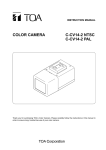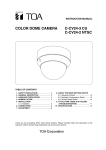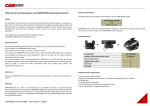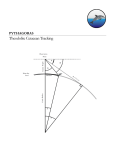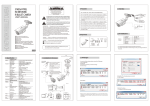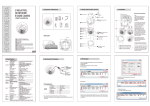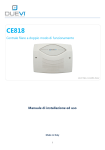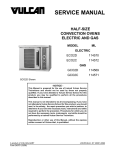Download VIZIO C-CV454D-9 CU User's Manual
Transcript
INSTRUCTION MANUAL Outdoor Day/Night Camera Wide C-CV454D-3 CU Standard C-CV454D-9 CU Tele C-CV454D18 CU Thank you for purchasing TOA Outdoor Day/Night camera: Wide, Standard, or Tele. Please carefully follow the instructions in this manual to ensure long, trouble-free use of your equipment. TABLE OF CONTENTS 1. SAFETY PRECAUTIONS ............................................................................... 3 2. GENERAL DESCRIPTION ............................................................................. 5 3. HANDLING PRECAUTIONS .......................................................................... 5 4. NOMENCLATURE ............................................................................................. 6 5. INSTALLATION AND CONNECTIONS ...................................................... 7 6. ADJUSTMENT ................................................................................................. 12 7. ABOUT MODE SETTING SWITCH 7.1. Focus adjustment switch .................................................................................. 15 7.2. Backlight compensation switch ........................................................................ 15 7.3. Flickerless switch ............................................................................................. 15 7.4. ATW/AWB selection switch .............................................................................. 16 7.5. Mode selection switch ...................................................................................... 16 8. TROUBLESHOOTING .................................................................................... 17 9. SPECIFICATIONS ............................................................................................ 18 Accessories ............................................................................................................. 19 2 1. SAFETY PRECAUTIONS • Before installation or use, be sure to carefully read all the instructions in this section for correct and safe operation. • Make sure to observe the instructions in this manual as the conventions of safety symbols and messages regarded as very important precautions are included. • We also recommend you keep this instruction manual handy for future reference. Safety Symbol and Message Conventions Safety symbols and messages described below are used in this manual to prevent bodily injury and property damage which could result from mishandling. Before operating your product, read this manual first and understand the safety symbols and messages so you are thoroughly aware of the potential safety hazards. WARNING Indicates a potentially hazardous situation which, if mishandled, could result in death or serious personal injury. • To prevent lightning strikes, install the unit at least five meters away from a lightning rod, and yet within the protective range (angle of 45°) of the lightning conductor. Lightning strikes may cause a fire, electric shock or personal injury. • Install the unit only in a location that can structurally support the weight of the unit and the mounting bracket. Doing otherwise may result in the unit falling down and causing personal injury and/or property damage. • Use nuts and bolts that are appropriate for the ceiling's or wall's structure and composition. Failure to do so may cause the unit to fall, resulting in material damage and possible personal injury. • Tighten each nut and bolt securely. Ensure that the bracket has no loose joints after installation to prevent accidents that could result in personal injury. • Avoid installing the unit in locations exposed to sea breeze or corrosive gas. The unit or its mounts may be subject to corrosion, that might cause it to fall or result in other accidents. • If any of the following irregularities occurs, immediately switch off the power, and inform the shop from where the unit was purchased. Further using the unit may result in fire or electric shock. · If you detect smoke or a strange smell coming from the unit. · If water or any metallic object gets into the unit · If the unit falls, or the unit case breaks · If the connection cable is damaged (exposure of the core, disconnection, etc.). · If it is malfunctioning (no tone sounds when an optional microphone unit is connected.). · If it is malfunctioning (no image appears.). • Do not insert nor drop metallic objects or flammable materials inside the unit, as this may result in fire or electric shock. • Do not mount the unit in locations exposed to constant vibration. The mounting screws and/or bolts may be loosened by excessive vibration, potentially causing the unit to fall, which could result in personal injury. • To prevent a fire or electric shock, never open nor remove the unit case as there are high voltage components inside the unit. Refer all servicing to qualified service personnel. 3 CAUTION Indicates a potentially hazardous situation which, if mishandled, could result in moderate or minor personal injury, and/or property damage. • Leave the installation of the unit to your TOA dealer because the installation requires expert experience and skills. The unit may fall off if incorrectly installed, resulting in possible personal injury. • Do not stand or sit on, nor hang down from the unit as this may cause it to fall down or drop, resulting in personal injury and/or property damage. • Be sure to inspect the unit periodically for safety use. Deterioration of the installed part may cause dropping of the unit, resulting in personal injury and/or property damage. Contact your TOA dealer as to the periodical inspection. • Avoid touching the unit's sharp metal edge to prevent injury. • Switch off the power for safety purposes when cleaning or leaving the unit unused for 10 days or more. Doing otherwise may cause a fire or electric shock. CU version complies with Part 15 of the FCC Rules. Note This equipment has been tested and found to comply with the limits for a Class B digital device, pursuant to Part 15 of the FCC Rules. These limits are designed to provide reasonable protection against harmful interference in a residential installation. This equipment generates, uses and can radiate radio frequency energy and, if not installed and used in accordance with the instructions, may cause harmful interference to radio communications. However, there is no guarantee that interference will not occur in a particular installation. If this equipment does cause harmful interference to radio or television reception, which can be determined by turning the equipment off and on, the user is encouraged to try to correct the interference by one or more of the following measures: • • • • Reorient or relocate the receiving antenna. Increase the separation between the equipment and receiver. Connect the equipment into an outlet on a circuit different from that to which the receiver is connected. Consult the dealer or an experienced radio/ TV technician for help. Modifications Any modifications made to this device that are not approved by TOA Corporation may void the authority granted to the user by the FCC to operate this equipment. 4 2. GENERAL DESCRIPTION The TOA C-CV454 series are outdoor Day/Night cameras equipped with a 1/3" CCD. A lineup of cameras with three types of lenses, Wide, Standard, and Tele allows accurate monitoring over a wide range from near to distant subjects depending on the installation location. Noise reduction function enables clear image to be viewed in lower noise under poor lighting conditions. It functions as a color camera in the daytime and as a high-sensitivity monochrome camera in darkness, making it ideal for installation in locations that require around-the-clock monitoring. Its dust-proof and waterproof (IP66) construction permits it to be mounted to an outdoor wall or ceiling without using a special device. Angle of the camera unit can be adjusted freely regardless of installation location, allowing a wider area to be viewed. The C-CV454 series' power is supplied from 24 V AC or 12 V DC external power source. 3. HANDLING PRECAUTIONS • Do not direct the camera lens to the sun, strong lighting, or reflected light. If strong light enters the lens, this may cause the CCD's internal color filter to deteriorate, leading to image discoloration. • Do not give the camera a great shock or vibration to avoid camera damage. • It is recommended that the camera be always used in locations where the ambient temperature ranges from -10°C to +50°C and humidity levels of less than 90% to ensure that no condensation is formed. • To clean, wipe with a dry soft cloth. Never use benzene, thinner or chemically processed towel as the camera's plastic or other parts may be deformed or discolored. • When dust has settled on the camera's lens, lightly clean using a commercial camera blower or cleaning paper. • Installing the camera cables in close proximity to fluorescent lamps or other electrical appliances can downgrade the picture quality. In such cases, change the wiring. • If there is a strong electric or magnetic field near the camera, such as television transmission antennas, motors or transformers, this may distort or roll the monitor picture. In such cases, run the entire wiring route through metal conduit tubing. • When using an optional microphone unit, avoid installing it near air-conditioner outlet vents or in such highnoise. • When the camera shoots a subject projected by an infrared illuminator in a dark place, its mode may frequently switch between color and black-and-white. This is due to intensive light from the infrared illuminator. In such cases, change the illuminator’s projection angle to reduce the amount of light on the subject. • When operating on 12 V DC, use the external power supply rated at 12 V DC and over 1.0 A. 5 4. NOMENCLATURE [Appearance] 6 7 1 2 3 5 4 [View with sunshade, front cover, and mounting bracket detached] 8 9 10 11 12 13 15 OFF HEAD FIXING [View with waterproof cap detached] 16 ON F.ADJ BLC 1/100 1/60 ATW D/N AWB COLOR IRIS L 17 18 (1) (2) (3) (4) (5) (6) (7) (8) (9) Vari-focal lens Sunshade Front cover Mounting bracket (accessory) Safety wire mounting hole Sunshade fixing screw Bracket mounting bolt (accessory) Monitor output terminal (RCA jack) Zoom ring fixing screw H 14 (10) (11) (12) (13) (14) (15) (16) (17) (18) Focus ring fixing screw Focus ring Zoom ring Mode setting switch Iris control Cable with waterproof cap (accessory) Video output terminal Camera head fixing plate Camera head fixing screw Note The C-CV454D18 differ in positions of the focus ring and zoom ring from those above, being (11) Zoom ring and (12) Focus ring. 6 5. INSTALLATION AND CONNECTIONS [Ceiling mounting example] [Wall mounting example] Camera mounting bolt M8 or W3/8 Bracket mounting bolt with washer, stainless steel (accessory) WARNING Safety wire mounting hole Install the unit only in a location that can structurally support the weight of the unit and the mounting bracket. Doing otherwise may result in the unit falling down and causing personal injury and/or property damage. Note Install a safety wire as needed. Select the wire considering its length, diameter, and hook strength. 1. Check the mounting bracket’s installation location, and determine its mounting direction and position. Depending on the installation location, installation options are available as shown in the examples 1 - 3. 12 mm 97.6 mm 4-6 x 12 mm φ10.5 mm φ76 96 mm φ50 mm mm 70° 120° 7 [Example 1: Mounting to a ceiling or wall] [Example 3: Mounting to a ceiling or wall] If only fine adjustment of camera angle is required; Camera mounting bolt M8 or W3/8 Camera mounting bolt M8 or W3/8 [Example 2: Mounting on a wall] If angle which Example 1 can not cover is required; Camera mounting bolt M8 or W3/8 8 Anti-rotation screw (tapping screw) Note Installing the mounting bracket using only one camera mounting bolt may cause the bracket to rotate or the bolt to come loose. Be sure to secure it with an antirotation screw (tapping screw). 2. Install an anchor nut into a ceiling or a wall, then secure the mounting bracket. Anchor nut M8 or W3/8 Ceiling Mounting bracket Anchor nut M8 or W3/8 Ceiling Mounting bracket Anti-rotation screw (tapping screw) Plain washer Plain washer Spring washer Spring washer Camera mounting bolt M8 or W3/8 Camera mounting bolt M8 or W3/8 3. Install the camera unit to the mounting bracket using the supplied insulating spacers and Bracket mounting bolts (with washer, stainless steel). Note Be sure to position the insulating spacers between the bracket and bolt, as induction voltage or noise may be produced at the joints depending on installation conditions. Also, do not remove the insulating washers attached to the mounting bracket. Mounting bracket Bracket mounting bolts (with washer, stainless steel) Insulating spacer The insulating washers are attached to the mounting bracket. 9 4. Connect the connector. Connect the connector of the supplied cable with waterproof cap to the camera unit's video output terminal, then tighten the lock screw of the connector. Notes • To meet the waterproof requirements, insert the connector in place until it will not go any further. • Wrap self-adhesive butyl rubber tape around cable joints in order to prevent rain from soaking in. Connector (waterproof type) UL 1095#22 Black/White (non-polar) Waterproof cap Cable joints Connect to the AC mains. Connect to the monitor. Lock screw Video output terminal BNC jack BNC plug Supplied cable 5. Attach the waterproof cap to the camera unit. Note If the waterproof cap is not secured to the mounting surface, water or moisture soaks in, causing the corrosion of the BNC connector. This may cause unit failure. Check to be sure that the waterproof cap is secured as shown below. Fit the waterproof cap (shaded area) into place. 10 6. Connect the camera unit. Connect the camera unit to both the monitor and the power supply as illustrated below. Notes • If the Video output is not terminated at 75Ω, camera images are not properly displayed. Make sure that the output has been terminated at 75Ω at the connected monitor or switcher. • The microphone unit cannot be used for the C-CV454 series. Monitor : BNC plug Video output Video input Power supply Video output terminal 24 VAC or 12 VDC When operating on 12 VDC, use the external power supply rated at 12 VDC and over 1.0 A. 11 6. ADJUSTMENT 1. After completing camera unit installation and connections, remove both the sunshade and front cover. [Removing sunshade] [Removing the front cover] Loosen two sunshade fixing screws. Turn the front cover in the direction indicated by the arrow to remove. Turn the sunshade, then extract it. Front cover 2. Connect the camera’s monitor output terminal to the monitor. Note: The camera will not operate if the monitor output terminal is connected to the camera drive unit. 3. Switch on the power supply. The power is supplied to the camera, permitting the camera images to be viewed on the monitor. 4. Set each mode setting switch to the position that provides the best picture reproduction. • If flicker may cause a nuisance, turn the Flickerless switch to ON. • If the camera images will be too dark, turn the Backlight compensation switch to ON. Note: For the details, refer to p. 15, “About mode setting switch.” 12 5. Adjust the camera angle. • Camera's orientation can be adjusted with the camera mounting and bracket mounting bolts loosen. • Adjust the inclination of image so that the projection of the camera faces upward by loosening a camera head fixing screw and turning the camera head. After adjustment completion, retighten the camera head fixing screw. Note Horizontal camera angle cannot be adjusted if the camera unit is installed as shown in [Example 3] on page 8. Camera mounting bolt Horizontal angle: ± 60° Bracket mounting bolts Focus ring Mode setting switch Zoom ring OFF Projection Camera head ON F.ADJ BLC 1/100 AWB R COLO 1/60 ATW D/N IRIS H L Angle of view: ± 90° (Turn the Camera head) Iris control Vertical angle: 90° (For the ceiling installation) The C-CV454D18 differ in positions of the focus ring and zoom ring; their positions are exchanged. HEA FIXI D NG MO NIT OR OU T Camera head fixing screw 6. Adjust the camera's angle of view. Adjust the angle of view with the Zoom ring and the focus with the Focus ring for the best possible picture reproduction. Notes • Since the Iris control (for sensitivity adjustment) is factory-preset to an optimum position for general use, avoid tampering with it in normal conditions. Turning the control unnecessarily could cause reduced picture quality or equipment failure. When the Iris control needs to be readjusted to match a specific subject, first set both the Adjustment switch and the Backlight Compensation switch of the Mode switch to the OFF position, then adjust the control to an optimum level. After adjustment, cover the lens with your hand for several seconds and then release to check the lens for correct iris operation. • If the focus is adjusted when the subject is bright, the subject may go out of focus when it grows dark. To avoid this, adjust the lens focus after setting the Adjustment switch of the Mode setting switch to the ON position. Be sure to switch it back to the OFF position after completing lens adjustment. • When the camera shoots a subject projected by an infrared illuminator in a dark place, its mode may frequently switch between color and black-and-white. This is due to excessively strong light from the infrared illuminator. In such cases, change the illuminator’s projection angle to reduce the amount of light on the subject. • Turning the Iris control toward the "L" position may cause the camera not to switch to black-and-white mode smoothly. 13 7. After completing all the adjustments, disconnect the cable connected to the monitor output terminal in Step 2. 8. Tighten both the camera mounting and bracket mounting bolts, then replace the front cover. Note: If the front cover is not secured enough, waterproof effect is reduced, causing unit failure. 9. Insert the sunshade from the front side of the camera unit as shown below, then secure it with two sunshade fixing screws. [Ceiling mounting example] Sunshade fixing screw (Screw with captive washer M3x8) Slot to insert the sunshade fixing screw Sunshade Sunshade fixing screw After inserting the sunshade, turn clockwise to fix it in position (as shown), then secure it with the sunshade fixing screws. 14 7. ABOUT MODE SETTING SWITCH Set each switch to the position that provides the best picture reproduction. OFF OFF ON 1/60 ATW D/N AWB COLOR IRIS L H ON 1/60 F.ADJ BLC 1/100 ATW D/N AWB COLOR F.ADJ BLC 1/100 1: Focus adjustment switch 2: Backlight compensation switch 3: Flickerless switch 4: ATW/AWB selection switch 5: Mode selection switch Mode Setting Switch (Factory-preset setting) 7.1. Focus adjustment switch: Set to “ON” position when adjusting focus. (This setting provides the same effect as when using an ND filter.) OFF ON OFF ON Standard position: After focus adjustment completion, set the switch to “OFF” position. Set to “OFF” position during normal use. Focus adjustment position (during adjustment): Set to “ON” position when adjusting focus. The subject that was brought into focus when it is bright could be out of focus when it grows dark. In such cases, set the Focus adjustment switch to “ON” position only when adjusting focus. Note: When the Focus adjustment switch is set to “ON” position, the color of the screen may change periodically if the camera is used under fluorescent lighting. Further, the screen may flicker in areas where the electrical frequency is 50Hz. 7.2. Backlight compensation switch: Set to “ON” position to avoid making the subject too dark when it is backlit. OFF ON OFF ON Standard position: Set to “OFF” position during normal use. Backlight Compensation function does not operate when the switch is set to this position. Backlight Compensation position: This position compensates images from (when backlit) it is backlit. being became too dark when 7.3. Flickerless switch: Set to “ON” position when annoying screen image flicker is detected. OFF ON OFF ON Standard position: Set to “ON” position during normal use. Flickerless: Annoying screen flicker may result under fluorescent lighting in areas where power frequency is 50 Hz. In such cases, set the Flickerless switch to “ON” position to permit a flicker-free picture to be viewed. Note If the Flickerless switch is set to “ON” position, sensitivity is reduced compared to operation in the OFF position. When using the camera in dark conditions, or where light flicker is not an annoyance, set the switch to “OFF” position. 15 7.4. ATW/AWB selection switch: Set the white balance operation. OFF ON ATW: Set to “OFF” position during normal use. The camera's white balance automatically changes as an object's color temperature varies. OFF ON AWB: Set to “ON” when the difference between the displayed color and actual color is annoying. Shoot the white object, then turn the switch ON. The camera operates on the initially set white balance even if an object's color temperature changes. 7.5. Mode selection switch: Set the operation when the subject becomes dark. 16 OFF ON D/N: The camera mode automatically switches from color to black-and-white operation when the subject becomes dark. OFF ON COLOR: The camera mode does not switch to black-and-white operation even when the subject becomes dark. The camera always generates color images. 8. TROUBLESHOOTING Possible Cause Symptom No camera image dis- Cables are not correctly connected. played on the monitor. BNC plugs are not correctly soldered. Camera image is not Camera lens does not focus properly. clear. Lens is dirty. Image black level of the monitor is not correctly adjusted. When the subject The subject that was brought into becomes dark, it could focus when it is bright could be out of focus when it grows dark. (Effect of be out of focus. depth of field) Camera images too bright Images curved. (In case of C-CV454D-3) The color of the camera image changes periodically. The screen flickers even when the Flickerless switch is set to “ON.” Noise is added in image. Remedy Connect the cables correctly. Solder BNC plugs correctly. Focus the lens. Remove dirt on the lens. Adjust the level correctly in accordance with the instruction manual of the monitor. Focus the lens again after turning the Focus adjustment switch of the Mode setting switch to “ON” position. (Refer to Step 6 on p.13.) After adjustment completion, be sure to turn the Focus adjustment switch of the Mode setting switch to “OFF” position. Pre-set iris control position changed. Adjust the Iris control to an optimum level. (Refer to Step 6 on p.13.) This camera unit uses a wide lens. Angle of view is set to Wide. As the screen curves if set to Wide, this is not a failure. The Focus adjustment switch is set Turn the Focus adjustment switch of the Mode setting switch to “OFF.” to “ON.” The Focus adjustment switch is set Turn the Focus adjustment switch of the Mode setting switch to “OFF.” to “ON.” Cables of other electric appliances Change the cable route. such as fluorescent lights are routed in proximity to the camera cable. Supplied insulator spacer is not Be sure to attach the supplied insulator space. (Refer to Step 3 on p. 9) attached. 17 9. SPECIFICATIONS Model No. Power Source Power Consumption Image Device Number of Effective Pixels Scanning System Scanning Frequency Monitor Output Video Output Synchronizing System Resolution (at center) S/N Ratio Minimum Illumination (Flickerless: OFF) Threshold illumination for mode switching White Balance Mode Focal Length Maximum Aperture Ratio Iris Angle of View Adjustment Switch Day/Night Mode Other Functions Water/Dust Protection Operating Temperature Operating Humidity Finish Dimensions Weight C-CV454D-3 (CU) C-CV454D-9 (CU) 24 V AC, 50/60 Hz or 12 V DC 4 W (300 mA, Maximum current: 800 mA) C-CV454D18 (CU) 1/3 type IT-CCD 771 (H) x 492 (V), 380,000 pixels 2:1 interlace Horizontal: 15.734 kHz, Vertical: 59.94 Hz VBS1.0 V(p-p), 75 Ω, RCA pin jack VBS1.0 V(p-p), 75 Ω, Water-resistant connector Internal synchronization Horizontal: 540 lines (standard), Horizontal: 480 lines or more, Vertical: 350 lines Vertical: 350 lines 50 dB 0.5 lx (50 IRE, color operation), 0.1 lx (20 IRE, color operation), 0.05 lx (50 IRE, black and white operation, incandescent lamp) Color-to-B/W mode: Approx. 5 lx, B/W-to-color mode: Approx. 25 lx (incandescent lamp) ATW/AWB (switch selector) f = 3.0 mm - 9.0 mm 1 : 1.4 - 2.4 f = 9.0 mm - 22.0 mm 1 : 1.5 - 2.9 Auto-iris Horizontal: 90.3º - 31.9º, Horizontal: 30.6º - 13.0º, Vertical: 66.4º - 23.9º Vertical: 22.6º - 9.8º ON/OFF (used for focus adjustment) f = 18.0 mm - 50.0 mm 1 : 1.5 - 2.3 Horizontal: 14.6º - 5.6º, Vertical: 10.9º - 4.2º Automatic/Off (switch selector) Backlight compensation, Shutter speed, Iris control, Max.4 x Sensitivity increase (auto), Noise reduction IP66 -10ºC to + 50ºC (14ºF to 122ºF) 90% RH or less (no condensation) Front cover, rear cover, and sunshade: Aluminum, light gray, paint Mounting bracket: Stainless steel, light gray, paint ø92 x 230 (D) mm (ø3.62 x 9.06 (D) inch) (excluding mounting bracket) 1.2 kg (2.65 lb) The design and specifications are subject to change without notice for improvement. 18 • Accessories Mounting bracket ..................................................................................... 1 Cable with waterproof cap (2 m) .............................................................. 1 Bracket mounting bolts (with washer, stainless steel) ............................. 2 Insulating spacer ...................................................................................... 2 • Optional products Pole mounting bracket : C-BC450PM 19 URL: http://www.toa.jp/ 133-22-161-10





















